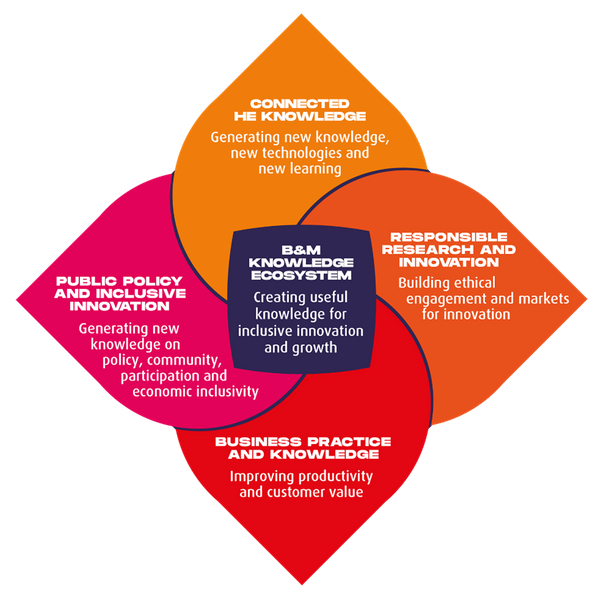A Shared Vision of a Business & Management Knowledge Ecosystem
The recent publication of the OECD’s Economic Outlook, No Ordinary Recovery: navigating the transition, and the UK Innovation Strategy: Leading the future by creating it from the UK Government’s Department for Business, Energy & Industrial Strategy (BEIS), makes it timely to highlight the ways in which business and management research can support an ambitious agenda to drive socio-economic recovery from the COVID-19 pandemic and, at the same time transform the UK into a zero-carbon economy.
The Economic and Social Research Council (ESRC), the British Academy of Management (BAM), and the Chartered Association of Business Schools (Chartered ABS) share an ambition to make the UK a global leader in business, science and social science partnerships. Working together, we want to support social scientists and businesses to engage with one another, helping to support an effective ecosystem that will deliver productivity, inclusion, sustainability and innovation to the UK. We are committed to working in partnership to bring together, and work with, the best that the UK has to offer among business and management researchers and showcase the added value and impacts from these partnerships
BAM and Chartered ABS: UK management and business studies ecosystem approach
Research conducted in business and management studies already plays an integral role in engaging with businesses and other organisations. It has the capacity to influence every sector of the economy and has the potential to form the centre of an ecosystem of support. This includes connecting business and management researchers, business schools, funders, other disciplinary researchers, practitioners, and policymakers in the co-production and exchange of knowledge.
We believe that, with support, management and business schools and learned societies can do even more to champion, promote, shape and catalyse business engagement on behalf of the wider social sciences, taking a leadership role in their institutions.

This ecosystem is inclusive and focuses on collaboration. It draws attention to the need to develop five key areas and incentives that foster a distinctive set of skills within industry, research and business schools.
It also includes a learning orientation to increase the flow of good practice between organisations.
This Business and Management Knowledge ecosystem supports innovation and engaged research, contributes to the co-production of practical and accessible knowledge, opens up opportunities for better training and skills development within businesses, supports adoption of emerging technologies and new processes, and increases the productivity and sustainability of organisations. This catalyst enables innovative collaboration between Higher Education, Business, Public Policy, and Responsible Research and Innovation:
- Connected HE Knowledge represents the Higher Education disciplines that work with, and contribute to, the generation of scientific, technical and social science knowledge that drives innovation in organisations and society.
- Business Practice and Knowledge represents the connections between organisations and their networks of suppliers and buyers. Their primary focus is on improving productivity and sustainability, generating value for customers and will include a variety of businesses from micro and small enterprises to blue chip organisations.
- Public Policy and Inclusive Innovation represents policymakers and their key stakeholders, including public groups and non-government organisations (NGOs), and publics that shape and deliver public value, and nurture community participation to generate an inclusive marketized society and economy.
- Responsible Research and Innovation (RRI) represents the collaborative engagements between STEM, social science and humanities researchers, working directly with commercial, government and non-government organisations, and other key stakeholder groups to develop real-world solutions. Through these collaborative efforts RRI simultaneously builds ethical engagement and markets for innovation.
Working together, BAM and Chartered ABS can help by:
- Encouraging engagement with micro-businesses, small businesses and business clusters using development and scale-up schemes designed to make individual organisations stronger and to produce more connected, collaborative and productive clusters of organisations.
- Increasing and strengthening business school and researcher engagement with the full range of public, private and charitable organisations to identify and seek solutions to real-world problems for every part of the economy.
- Supporting engaged, interdisciplinary, action-oriented research. For example, vaccinating the world against Covid does not start and end with developing a vaccine. It includes how to manufacture at scale, transport and logistics, how to share available vaccines with poorer countries and how to encourage people to be vaccinated. These issues require expertise from business and management studies and this pattern is replicated with many other technology-led innovations.
- Generating broader business and management learning and best practice guidance.
- Collaborating to provide Masters level and Doctoral students with the skills needed for engaged problem-solution-based research.
- Acting as a clearing house for businesses by using business school knowledge to match the right skills and research insights to specific business, organisational and management need.
- Showcasing and evidencing where collaborations with business and management research have achieved real-life impact in business and society.
Through these kinds of activities we can help the UK to innovate nationally and regionally. We will nurture a dynamic understanding of what constitutes good and effective knowledge exchange and business practice, generate more effective mechanisms to catalyse engaged research collaboration and impact, and develop more holistic and inclusive approaches to supporting problem-based research.
This shared mission marks an exciting shift. It is an opportunity for business and management research to make an even bigger difference; not just in shaping the research being conducted but in transforming how the ESRC, BAM and the Chartered ABS work together to help our communities deliver real value for society.
Contact BAM ([email protected]) or Chartered ABS ([email protected]) if you want to learn more and register your interest.
